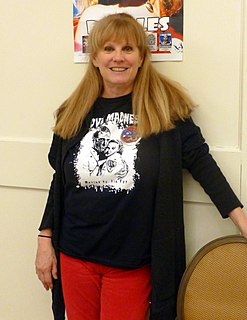A Quote by Nicholas Meyer
Roddenberry had his own utopian vision about he perfectibility of man, and I never really believed that. And I don’t think the show demonstrates that. I think it is about gunboat diplomacy. In the final analysis, the Enterprise fires. They’re always shooting and bringing civilization, and coming to worlds where they don’t approve of tyrannical enterprises – no pun intended – and they substitute their own quote unquote enlightened version of how society is supposed to work, which is essentially American.
Quote Topics
Related Quotes
I think that if you are sticking to the text, essentially, you're not trying to write your own version of it. I mean, of course, it is your own version of it. And every translator would probably have a different version. But I think that that's what keeps the writers from being individual in English. They may be my English, but I don't think that Ferrante sounds like Levi.
We are so isolated in our own little worlds, in our own little geographies, that it's pretty hard to understand where someone else is coming from. And so I think that we have to really think about what that means as a country and, frankly, whether this segregation that we have is durable over the long run.
The press is no substitute for institutions. It is like the beam of a searchlight that moves restlessly about, bringing one episode and then another out of darkness into vision. Men cannot do the work of the world by this light alone. They cannot govern society by episodes, incidents, and eruptions. It is only when they work by a steady light of their own, that the press, when it is turned upon them, reveals a situation intelligible enough for a popular decision.
In my case, I think my exile saved my life, for it inexorably confirmed something which Americans appear to have great difficulty accepting. Which is, simply, this: a man is not a man until he is able and willing to accept his own vision of the world, no matter how radically this vision departs from others.
My strategy to show caricature idea of American youth culture, which I think worked after talking about it for so many years, is that I had only a few things. I wanted to buy my own wardrobe for Rock 'N' Roll High School, which of course they said "Yes" to, because their clothing budget was $200, and I ended up spending my whole salary - which I think was about $2,100 - on my clothes. And also, any time I was onscreen, I wanted to have as much energy as I possibly could. I think it just really worked for the character.
There's this pet phrase about writing that is bandied around particularly in workshops about "finding your own voice as a poet", which I suppose means that you come out from under the direct influence of other poets and have perhaps found a way to combine those influences so that it appears to be your own voice. But I think you could also put it a different way. You, quote, find your voice, unquote, when you are able to invent this one character who resembles you, obviously, and probably is more like you than anyone else on earth, but is not the equivalent to you.
We cannot create blueprint for future society, but it is good to think about that. It is good to have in mind a goal. It is constructive, it is helpful, it is healthy, to think about what future society might be like, because then it guides you somewhat what you are doing today, but only so long as this discussions about future society don't become obstacles to working towards this future society. Otherwise you can spend discussing this utopian possibility versus that utopian possibility, and in the mean time you are not acting in a way that would bring you closer to that.
For me, when we came out with a TV show, my HBO show, so much of the feedback was, "How do I do it?" And my response was always the same: "Just make something." Stop talking about it. You do in a way that the work takes on a life of its own. Like the "Signature" series [(2008), in which the artist trekked across the United States in the shape of his own signature] was a simple concept that became this story about the people you met along the way.
I've never really been met with indifference, where they say, 'Who cares?' I think that's what good art is supposed to do. It's not supposed to make you feel good about your own prejudices and your own values; it's supposed to open you up in some way and get you outraged or make you happy or make you sad or whatever it's going to do.
Thirdly, the supreme power cannot take from any man any part of his property without his own consent: for the preservation of property being the end of government, and that for which men enter into society, it necessarily supposes and requires, that the people should have property, without which they must be supposed to lose that, by entering into society, which was the end for which they entered into it; too gross an absurdity for any man to own.






































